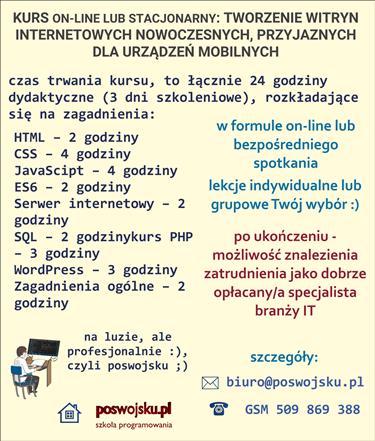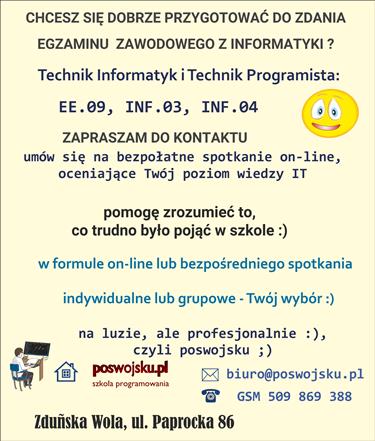
Szkolenia informatyczne: biuro, technologie internetowe, egzaminy technik
CENA - OFERTA: Jesteś zainteresowany/na kursem – zapraszam do kontaktu ze mną, szczegóły: www.poswojsku.pl .
Preparation for finding a job - how to prepare for a meeting with an employer
Preparation for finding a job - how to prepare for a meeting with an employer
BASIC CONCEPTS RELATED TO JOB SEARCHING
Recruitment - the basic way of development of all enterprises and a chance for the unemployed?
What is recruitment? Definitions of important terms related to recruitment.
Is recruitment just recruiting staff from outside?
Who can recruit? Own or foreign? Rules for choosing the recruitment form.
Preparation for finding a job - how to prepare for a meeting with an employer
To start with, it's worth getting to know the basic definitions related to recruitment.
RECRUITMENT , also called recruitment or recruitment of employees is the basic way of developing human resources of most enterprises. Its primary goal is to find the optimal employee for a specific work position. From the point of view of the company, and from the point of view of you - a job seeker - recruitment is a chance for a change in your life, a chance for a job, money, promotions, honors, and maybe for your being or not to be. That is why you should prepare very carefully for the recruitment process, the better prepared you are - the greater your chances of making positive changes will be.
 HUMAN RESOURCES (HR) , i.e. Human Resources Management (HRM) - is one of the most important elements of business management. He deals with, among others: surveying job satisfaction; improving the organization, improving its condition; labor cost analysis; conducting activities aimed at evoking positive associations about the employer; short- and long-term assessment of employees; human resource planning; workplace design; creating incentive systems; building employees' career paths; job evaluation;
HUMAN RESOURCES (HR) , i.e. Human Resources Management (HRM) - is one of the most important elements of business management. He deals with, among others: surveying job satisfaction; improving the organization, improving its condition; labor cost analysis; conducting activities aimed at evoking positive associations about the employer; short- and long-term assessment of employees; human resource planning; workplace design; creating incentive systems; building employees' career paths; job evaluation;
Curriculum Vitae (CV) - also called Resume - is simply a biography . Properly written, short and legible is a showcase in the eyes of the employer. An unattractive CV will disqualify you from the start of recruitment.
Cover Letter - we briefly describe in it why and for what purpose we write to a given company, who we are, what we can do, what we have already achieved and what we plan to do next.
Interview - interview with a job applicant.
Headhunting - literally: "catching heads", or recruitment of personnel.
Outsourcing - this is the transfer of external processes (e.g. recruitment) to external companies that are not the company's core business.
Assessment Center (AC) - Ośrodek / Centrum Pomiar (OO) ; it is a method of assessment consisting in subjecting candidates to a series of individual or group exercises related to typical tasks in a given position; allows for an objective assessment of participants' competences based on their actual behavior and skills.
Development Center (DC) - it is an employee development planning policy consisting in determining the employee's professional goals, examining his predisposition to achieve these goals and analyzing the company's current goals and capabilities with the employee's goals. On this basis, you can, among others construct an employee's career path plan.
Recruitment advertisement - a note (usually in the press) containing information about the enterprise's demand for an employee with specific qualifications.
Outplacement - one of the elements of restructuring, consisting mainly in helping redundant employees in finding a new job.
Preparation for finding a job - how to prepare for a meeting with an employer
As you can see there is a lot of it, and in addition not all terms are simple. And I can assure you that with the transition of most of them you could have big problems. In particular, be careful when you have to take part in AC - they are usually prepared by high-class specialists (psychologists, managers, HR specialists).
Complicating the recruitment process is not an invention of consulting companies or employers themselves. This is mainly because the effectively conducted recruitment process saves companies many worries and allows them to avoid unnecessary costs in the long run. Therefore, people recruiting usually approach the recruitment process very professionally and want only professionals to participate in this process. So if you want to be taken seriously by them - you must become a professional! It is the aforementioned factors that decide that recruitment is often outsourced to specialized companies - known as "headhunting". Companies looking for employees in addition to outsourcing the recruitment process to personnel consulting companies, use many other methods to search for personnel. The most common are:
advertisements in the mass media (press, radio, internet),
searching through labor offices (in fact the least effective),
transfer of information to universities and schools,
organization of open days in the company.
Recruitment can be carried out both inside and outside the company concerned.
Preparation for finding a job - how to prepare for a meeting with an employer
Recruitment is a process that can take place in two forms
-
internal activities
-
external action
On the one hand, internal recruitment optimizes the adaptation of staff and their skills to the real needs of the organization, and on the other hand allows retaining valuable employees in the company who are not satisfied with their current position or hold the position to be liquidated. Responsibility for internal recruitment should be charged to the HR department, which should, through periodic employee analysis and assessments, be able to determine the place of each person in the company.
So remember - if you work and want to change job, maybe you should not look for a job outside of your employer, maybe it is worth to orientate in its internal structures, whether there is no vacancy in the position that interests you.
But let's get back to the basic issue - external recruitment, i.e. recruiting employees from the labor market. It usually consists of the following stages:
1. needs analysis - determining the name of the job vacancy and its description (evaluation), and through these activities - formulation of conclusions as to the characteristics of the candidate sought,
2. defining how we will be looking for a candidate - e.g. through a press advertisement or through a specialized consulting company and developing tools necessary for the search process, such as a press advertisement and of course implementing specific recruitment methods,
3. analysis of received application documents in order to arrange a meeting with the candidates most suitable for a given position,
4. interview , i.e. meeting with selected candidates in order to select a few of the best who will receive an invitation to the next, more advanced round of meetings,
5. conducting a second round of meetings , usually based on case studies and / or psychometric tests (it is at this stage that AC is used very often),
6. presenting the best 2-3 candidates to the decision-maker (usually a direct supervisor), i.e. a person who is interested in admitting an employee to his team,
7. making the final decision and summarizing the recruitment process at this stage someone obviously receives the dream position.
Preparation for finding a job - how to prepare for a meeting with an employer
Of course, it may happen that some of the abovementioned stages will not take place, such as the second round, because it turns out that after the first round one of the candidates will significantly differ from the others and the employer will decide to employ him without carrying out the subsequent stages. However, this is not very recommended, because the second round often verifies our assessment of the candidate quite significantly. In addition, there are often more than two stages in practice. This is because if too many candidates pass the second round, then you need to make additional meetings to choose only two or three to meet the person interested in expanding your team. In our realities it also happens that the recruiter is also the employer and then the last stage is simply superfluous.
As you can see, recruitment is an even more complicated process for a company than for you. So be a professional and your employer will treat you seriously. To better understand why the recruitment process is lengthy and requires you to be professional, persistent and decisive - see how complicated it is - based on an outline of the sample preparation process for the recruitment stage in our next articles.




 poswojsku.eu
poswojsku.eu